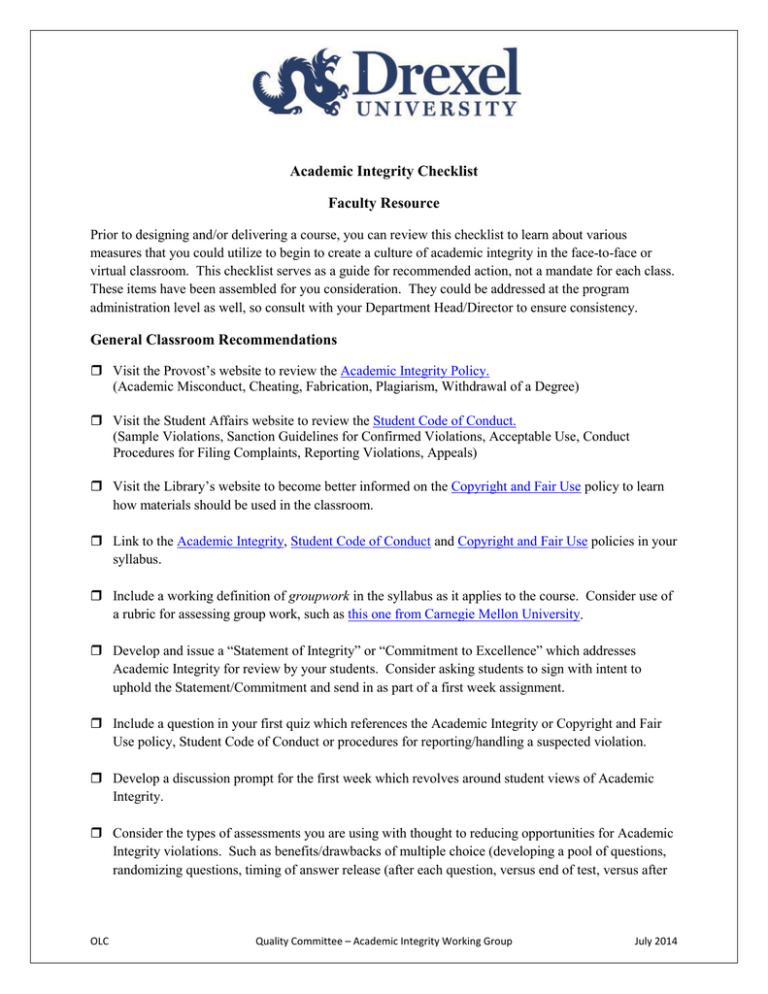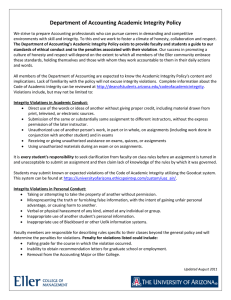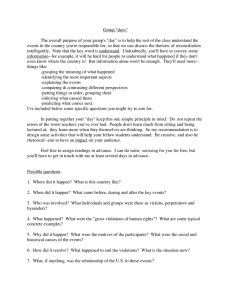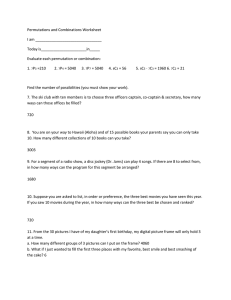Academic Integrity Checklist Faculty Resource
advertisement

Academic Integrity Checklist Faculty Resource Prior to designing and/or delivering a course, you can review this checklist to learn about various measures that you could utilize to begin to create a culture of academic integrity in the face-to-face or virtual classroom. This checklist serves as a guide for recommended action, not a mandate for each class. These items have been assembled for you consideration. They could be addressed at the program administration level as well, so consult with your Department Head/Director to ensure consistency. General Classroom Recommendations Visit the Provost’s website to review the Academic Integrity Policy. (Academic Misconduct, Cheating, Fabrication, Plagiarism, Withdrawal of a Degree) Visit the Student Affairs website to review the Student Code of Conduct. (Sample Violations, Sanction Guidelines for Confirmed Violations, Acceptable Use, Conduct Procedures for Filing Complaints, Reporting Violations, Appeals) Visit the Library’s website to become better informed on the Copyright and Fair Use policy to learn how materials should be used in the classroom. Link to the Academic Integrity, Student Code of Conduct and Copyright and Fair Use policies in your syllabus. Include a working definition of groupwork in the syllabus as it applies to the course. Consider use of a rubric for assessing group work, such as this one from Carnegie Mellon University. Develop and issue a “Statement of Integrity” or “Commitment to Excellence” which addresses Academic Integrity for review by your students. Consider asking students to sign with intent to uphold the Statement/Commitment and send in as part of a first week assignment. Include a question in your first quiz which references the Academic Integrity or Copyright and Fair Use policy, Student Code of Conduct or procedures for reporting/handling a suspected violation. Develop a discussion prompt for the first week which revolves around student views of Academic Integrity. Consider the types of assessments you are using with thought to reducing opportunities for Academic Integrity violations. Such as benefits/drawbacks of multiple choice (developing a pool of questions, randomizing questions, timing of answer release (after each question, versus end of test, versus after OLC Quality Committee – Academic Integrity Working Group July 2014 all complete assessment, non-automated option: requires faculty member to reach out and provide individual results directly)) versus Essay, Authentic Learning versus “testing out”. Request an ungraded sample of all student individual writing (especially important for a class which is mostly evaluated in a qualitative way) in the first two weeks, so it can be compared to subsequently submitted writing assignments to consider writing style and ability. Work with The Drexel Writing Center , University Libraries, and/or First-Year Writing Program to build a folder or module dedicated to communicating resources available with their offices. Host or link to a plagiarism tutorial or workshop, specifically for your students to attend. Remind all students of the policies when sending out homework and project assignments, and prior to engagement in all assessments. Host a live session with students dedicated to exploring how collaboration should be approached for group assignments, including the proofreading and submission phases. Use of Online Tools to Consider for Limiting Violations of Academic Integrity Video Intro IRT Resources and/or Assistance o TurnItIn o ProctorU o Respondus o Respondus Lockdown Browser o Respondus Monitor TinEye – reverse image search Kryterion – Online Proctoring OLC Quality Committee – Academic Integrity Working Group July 2014




